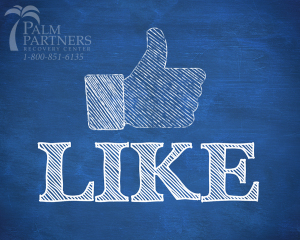By Cheryl Steinberg
In the past, we’ve written about social media and anonymity – mostly looking at the pitfalls of being in recovery in the digital age. But, what about the positive side of using social media as a tool – a benefit to your sobriety? Is that a possibility? And is it a good thing?
We wonder, is social media a tool for staying sober?
I, personally, am quite comfortable talking about being in recovery – both online and IRL (in real life). I post statuses that reveal when I’ve reached another sober anniversary. I share the blogs I write for my job as a blogger for this treatment center; blogs that often share parts of my personal story that deal with both my active addiction and my recovery.
I know I’m taking a personal risk by sharing this part of my life. I know that it means being vulnerable and therefore leaving me open to criticism, scrutiny, and judgment. But it’s a risk I’m willing to take because I believe being open about what it means to live in recovery is important for people ‘out there’ to learn about.
There are three main reasons that social media is a tool for staying sober:
Much like being sure to tell everyone that you are setting several personal health goals, such as going to the gym on a regular basis, sharing about my recovery is a way to help me stay accountable. If ever I find myself thinking about the ‘good ol’ using days,’ I remind myself that I have a whole bunch of people cheering me on to stay sober. All the ‘likes’ and comments I get encourage me to keep going.
Helping others
I was what people consider a “functional addict,” which was a big part of why I didn’t even consider getting help for a very long time. Of course, there was the usual denial that most of us experience but, because I wasn’t experiencing severe negative consequences, such as homelessness, joblessness, and legal issues, I think my denial lasted a whole lot longer and ran a whole lot deeper than what others might have experienced. I see sharing my story as an important service to others out there who might be like I was: getting by but totally miserable and not really sure why.
Similarly, I think it’s important to share about life in recovery and what that really means: that one, it’s possible and two, that it’s much, much more than simply “getting by” in life without using substances.
Changing the stigma
From my own previous conceptions of addiction, sobriety, and recovery and now, from current conversations I have with others as well as how these subjects are portrayed in the media and pop culture, I know that there remains a very negative stigma surrounding addiction. People still generally see it as a moral failing; that if you’re struggling with substance abuse, you are a bad person. Because of this, many people in active addiction are in hiding, afraid to face what they are and afraid to ask for help – for fear of being judged.
I believe that being open about my recovery is an important way that I can be in service: to help change the stigma of what it means to be in recovery and to hopefully encourage people in need of help to reach out for it.
———————————————————–
Fortunately, thus far, I’ve been lucky to receive only love and support from my friends and family (including my Facebook family). It’s possible that some people have unfriended me due to my history with addiction – and subsequent candor regarding it. But, to be honest, I didn’t notice. And I know not to take it personally. Most likely, my openness was uncomfortable for them, probably because they are living with their own secret(s).
Do you think you have a problem with alcohol or other substances? Do you want to stop but don’t know how? Help is available and recovery is possible. Please call toll-free 1-800-951-6135 to speak with an Addiction Specialist. We are available around the clock to take your call.
